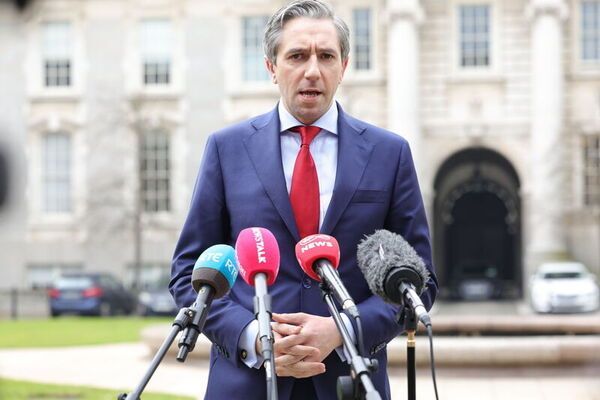Tánaiste Simon Harris joined other EU trade ministers for an extraordinary meeting in Luxembourg on Monday.
As the repercussions from President Donald Trump’s "Liberation Day" tariffs are felt on stock markets across the globe, the EU is split on how to respond to the 20 percent tariff on imports slapped on imports by Washington.
While Germany and France are pushing for retaliation, Ireland is urging caution and a “measured response."
Speaking as ministers were preparing to meet, Simon Harris said: “Ireland deeply regrets the recent announcements of U.S. tariffs on EU goods. It is extremely disappointing that we have ended up here.
“Today’s meeting is an important moment for EU Ministers to come together and reflect on next steps. I will make clear to my trade minister counterparts (Harris's broad ministerial portfolio includes trade) Ireland’s commitment to EU unity, and the need to take a firm, but proportionate response, while working towards a negotiated solution.
“A trade war is in no one’s interest. While we are disappointed that we have reached this point, we must continue dialogue and negotiation. There is always time to strike a deal.”
The European Commission has compiled a list of countermeasures that will hit selected imports from the U.S. EU member states will vote on the final list on April 9.
Speaking after the meeting, EU trade commissioner Maroš Šefčovič said: “We are prepared to use every tool in our trade defence arsenal to protect the EU single market, EU producers and EU consumers."
President of European Commission Ursula von der Leyen said that although the EU is ready to negotiate with the U.S. it is also “ready to take counter measures."
She added: “We will focus like a laser beam on the 83 percent of global trade that is beyond the U.S.”
Earlier, Taoiseach Micheál Martin warned: “The EU should clearly, I think, be transparent in terms of what could happen. In other worlds the [European] Commission will, in all likelihood, produce a list of potential countermeasures.
"They must be designed strategically and, in so far as is possible, not bring more damage on to the European economy. But the only way to ease the carnage on the stock markets is for a negotiated pathway between the U.S. and the EU.”









